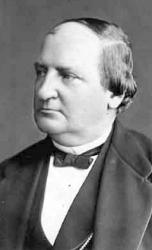Planning worship?
Check out our sister site, ZeteoSearch.org,
for 20+ additional resources related to your search.
- |
User Links
Person Results
Francis Bottome

1823 - 1894 Person Name: Francis Bottome, 1823-1894 Author of "O preist seiner Liebe Macht" in Glaubenslieder Bottome, F., S.T.D., was born in Derbyshire, England, May 26, 1823. In 1850, having removed to America, he entered the ministry of the Methodist Episcopalian Church; and in 1872 he received the degree of S.T.D. from Dickinson's College, Carlisle, Penn. In addition to assisting in the compilation of B. P. Smith's Gospel Hymns, London, 1872: Centenary Singer, 1869; Hound Lake, 1872, he has written:—
1. Come, Holy Ghost, all sacred fire. Invocation of the Holy Spirit. Appeared in R. P. Smith's Gospel Hymns, 1872. It is in several collections, including the Ohio Hymn Book of the Evangelical Association, 1881, No. 364.
2. Full salvation, full salvation. Joy of full Salvation. Written in 1871, and published in a collection by Dr. Cullis of Boston, 1873. Also in the Ohio Hymn Book, 1881, No. 384.
3. Love of Jesus, all divine. Love of Jesus. Written in 1872, and published in his Hound Lake, 1872. It is in several collections.
4. O bliss of the purified, bliss of the free. Sanctification. Written in 1869, and published in the Revivalist, and numerous hymn-books in America, including the Ohio Hymn Book as above, 1881, No. 477, &c.
His hymns, "Sweet rest in Jesus"; and "Oneness in Jesus," are also found in several collections for evangelistic services.
-- John Julian, Dictionary of Hymnology (1907)
Francis Bottome
William B. Bradbury

1816 - 1868 Person Name: William Batchelder Bradbury, 1816-1868 Composer of "[Welch Glück ist's, erlöst zu sein, Herr, durch dein Blut]" in Glaubenslieder William Bachelder Bradbury USA 1816-1868. Born at York, ME, he was raised on his father's farm, with rainy days spent in a shoe-shop, the custom in those days. He loved music and spent spare hours practicing any music he could find. In 1830 the family moved to Boston, where he first saw and heard an organ and piano, and other instruments. He became an organist at 15. He attended Dr. Lowell Mason's singing classes, and later sang in the Bowdoin Street church choir. Dr. Mason became a good friend. He made $100/yr playing the organ, and was still in Dr. Mason's choir. Dr. Mason gave him a chance to teach singing in Machias, ME, which he accepted. He returned to Boston the following year to marry Adra Esther Fessenden in 1838, then relocated to Saint John, New Brunswick. Where his efforts were not much appreciated, so he returned to Boston. He was offered charge of music and organ at the First Baptist Church of Brooklyn. That led to similar work at the Baptist Tabernacle, New York City, where he also started a singing class. That started singing schools in various parts of the city, and eventually resulted in music festivals, held at the Broadway Tabernacle, a prominent city event. He conducted a 1000 children choir there, which resulted in music being taught as regular study in public schools of the city. He began writing music and publishing it. In 1847 he went with his wife to Europe to study with some of the music masters in London and also Germany. He attended Mendelssohn funeral while there. He went to Switzerland before returning to the states, and upon returning, commenced teaching, conducting conventions, composing, and editing music books. In 1851, with his brother, Edward, he began manufacturring Bradbury pianos, which became popular. Also, he had a small office in one of his warehouses in New York and often went there to spend time in private devotions. As a professor, he edited 59 books of sacred and secular music, much of which he wrote. He attended the Presbyterian church in Bloomfield, NJ, for many years later in life. He contracted tuberculosis the last two years of his life.
John Perry
William B. Bradbury
Ernst Gebhardt
1832 - 1899 Person Name: Heinrich Ernst Gebhardt, 1832-1899 Translator of "O preist seiner Liebe Macht" in Glaubenslieder
Ernst Gebhardt
Franz Abt

1819 - 1885 Person Name: Abt Composer of "[Welch' Glück ist's erlöst zu sein]" in Evangelischer Liederschatz Franz Abt, born Dec. 21, 1819 at Eilenburg in the Prussian provinces of Saxony. His father was a musician and clergyman of the Lutheran Church. Franz studied music at Leipsic, and became known as a song-writer in 1838. In September, 1841, he married, and was leader of the orchesta at the Zuric theatre; became a teacher in 1842, but was litle known until his song "When the Swallows Homeward fly" carried his name to all parts of the civilized world. In 1865 was concert-master at Brunswick, and conducted the great festival at Dresden. He came to the United States in 1872, and was present at teh Peace Jubilee, Boston, where he directed the performance of some of his own music, arriving in New York May w, wher a testimonial concert was given for his benefit at Steinway Hall, May 18. He was received at Philadelphia by the German societies, with torch-light processions and cannonade, May 15, 1872.
A Dictionary of Musical Information by John W. Moore, Boston: Oliver, Ditson & Company, 1876
Franz Abt


 My Starred Hymns
My Starred Hymns


